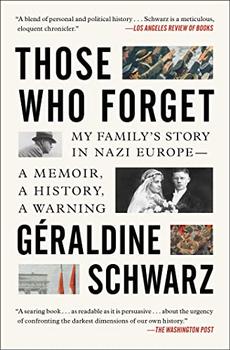Summary | Excerpt | Reading Guide | Reviews | Beyond the Book | Readalikes | Genres & Themes | Author Bio

My Family's Story in Nazi Europe – A Memoir, A History, A Warning
by Géraldine Schwarz
In reality, among the 69 million inhabitants who lived within the borders of the Reich in 1937, the number of Mitläufer surpassed the 8 million members of the NSDAP. Millions of others had joined affiliated organizations, and still more had cheered National Socialism without belonging to a Nazi organization. For example, my grandmother, who was not an NSDAP member, was more devoted to Adolf Hitler than my grandfather, who was an official party member. But the Allies didn't have time to examine such nuances. They already had enough to handle with the offenders, both major and lesser: the multitude of high-level officials who had given criminal orders within the bureaucratic labyrinth of the Third Reich, and the many who had executed those orders, oftentimes with an infamous zeal.
People like my grandfather who were members of the Nazi Party emerged almost unscathed. His only punishment was to lose control of his small petroleum products business, Mineralölgesellschaft Schwarz & Co., which was consigned for several years to an administrator appointed by the Allied authorities. He would probably have also found it difficult to get a job as a civil servant if he had wanted one. His daughter, my aunt Ingrid, thinks she remembers him being condemned to "break stones," but strangely, my father has no memory of this and is sure that, in the unlikely event of such a verdict, my grandfather, "clever as he was," would have arranged to spare himself the task. He mainly remembers that his father's business was never better than during that period of forced unemployment, as he turned out to be a much more resourceful businessman on the black market than on the regular one. He remembers that there was always wine on the Schwarz table, as well as meat, eggs, and apples—while many forgot the taste of these products in the ruins of Germany after the war. This discrepancy between the memories of Karl Schwarz's two children reflects the fact that one was as devoted to her father as the other was estranged from him.
Of course, the Allies couldn't throw all 8 million members of the NSDAP in prison, largely because there wasn't enough space behind bars. From spring 1945 on, the Allies moved forward with massive arrests of former party officials and members of the SS, sending about 300,000 of them to prison. Among the Allies, the Americans were by far the strictest in carrying out the denazification of their zone, at least at the beginning. As one of the largest cities of Baden-Württemberg, Mannheim, where my grandparents lived, was just inside the southwestern American zone, which included the north of Baden-Württemberg, Bavaria, and Hesse, along with the southwest of Berlin and Bremerhaven to the north, with its precious strategic location on the North Sea. The Americans had a good reputation, and my aunt Ingrid remembers them "always with a smile, healthy at the wheels of their Jeeps, adding a bit of cheerfulness" to the funerary atmosphere of postwar Germany. However, their commander, the future president of the United States Dwight D. Eisenhower, was quite pessimistic, estimating that it would take at least fifty years of intensive reeducation to mold Germans to democratic principles. The Americans were especially dependent on the media, which was under their control, to make the population feel the effects of crimes committed under the Third Reich and to convince the German people of democracy's charms. But above all, they had the titanic ambition to delve into the pasts of all Germans over eighteen by having them fill out questionnaires, each with about 130 questions designed to indicate their degree of complicity with the regime and their level of ideological indoctrination. With highly bureaucratic rigor, the Americans began to sift through the millions of forms on their desks, in the interest of punishing the guilty and removing the elements of society most deeply imbued with Nazism. They fired all the officials who had joined the NSDAP before May 1, 1937, and who were therefore suspected of belonging out of conviction. At the end of winter 1945–46, more than 40 percent of government officials in the American zone had been let go.
Excerpted from Those Who Forget by Géraldine Schwarz. Copyright © 2020 by Géraldine Schwarz. Excerpted by permission of Scribner. All rights reserved. No part of this excerpt may be reproduced or reprinted without permission in writing from the publisher.
Your guide toexceptional books
BookBrowse seeks out and recommends the best in contemporary fiction and nonfiction—books that not only engage and entertain but also deepen our understanding of ourselves and the world around us.